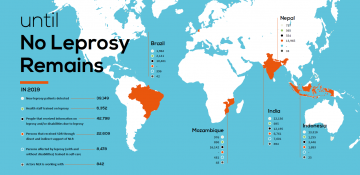Impact NLR 2019
This is an overview of the 2019 results of some important indicators to highlight the impact in the countries where we work (Brazil, India, Indonesia, Mozambique and Nepal).

Multiple interventions are necessary to work towards a world free from leprosy. NLR supports active case finding of new leprosy patients and we focus on proper training of health staff, information sharing, preventive treatment, training persons affected by leprosy in self-care and working with local partners. These are the indicators of our impact.
New leprosy patients detected (39,149)
NLR aims to prevent, detect and treat leprosy. NLR strives for a situation in which zero new leprosy patients are detected which is captured in this indicator.
Health staff trained on leprosy (6,352)
National programs, in particular health staff, play a crucial role in informing, advising and treating persons with leprosy, their contacts and the community in which they live.
People who received (one-on-one) information on leprosy (42,789)
If people are more aware of leprosy they will seek care more quickly or refer their relatives, friends and acquaintances to a health post. An informed community is less likely to discriminate against persons affected by leprosy, making those afflicted more likely to seek care. Greater awareness contributes to early diagnosis and treatment, which reduces the risk of disabilities. In addition, the chance of transmission decreases if persons affected by leprosy are treated quickly.
Persons who received SDR-PEP (22,609)
Reducing the number of leprosy patients was and remains an important goal for NLR to work towards for in 2019 and following years. Stopping transmission is critical to achieving this goal. Prescribing SDR-PEP to contacts will make it less likely they develop leprosy, which further reduces the chance of transmitting leprosy to others.
Persons affected by leprosy trained in self-care (8,478)
Persons affected by leprosy may experience a loss of sensation in their hands or feet. They may not realize they have a wound,
for example, and these wounds can eventually worsen, leading to permanent disability. It is therefore essential for someone who has (had) leprosy to take care in order to prevent disabilities and not to aggravate existing disabilities.
Groups and organisations that NLR works with (842)
NLR supports the set-up and empowerment of local self-care and self-help groups and Disabled People’s Organisations in which persons affected by leprosy can participate.